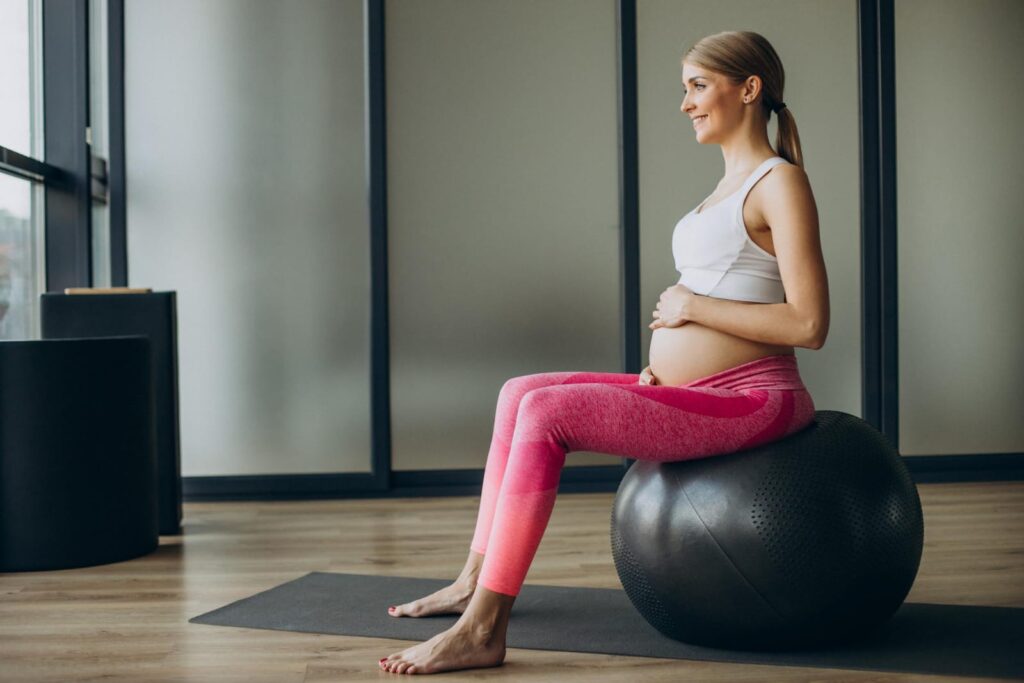BENEFITS OF REHABILITATION PILATES DURING PREGNANCY
Rehabilitation Pilates during pregnancy entails using exercises designed especially to meet rehabilitation demands while taking into consideration the unique constraints and changes brought on by pregnancy. By emphasizing specific exercises that improve strength, flexibility, and rehabilitation, it seeks to support the body while keeping the mother’s and the baby’s safety and wellbeing into consideration.
Enhancing core stability muscles is the main goal of Rehabilitation Pilates. These muscles are essential for maintaining good posture, supporting the spine, and facilitating general movement and functionality. Your uterus, placenta, growing baby, and changing organs are all housed in your core muscles throughout pregnancy, and these muscles extend a lot to make room for your growing baby. Common pregnancy symptoms such as low back pain, feelings of heaviness through the vagina and pelvic floor, and urine incontinence might be caused by a breakdown in the coordination of the core muscles. If this area is overly taxed, it can lead to diastasis recti i.e. the separation of rectus abdominis muscle. Therefore, building a strong core before and during pregnancy can help to manage the demands of pregnancy on the body and minimize diastasis recti and other pregnancy symptoms. Research shows Pregnant women also benefit from exercise with easier and shorter labor times and enhanced recovery postpartum. Research confirms that there are few-to-none adverse effects of exercising during a non-complicated pregnancy. However, it is always recommended to consult a qualified Pilates instructor or healthcare professional to ensure that exercises are tailored to your specific rehabilitation needs and limitations before starting an exercise program.
Rehabilitation Pilates class with a rehab Pilates instructor at ILUKA serves several advantages for pregnant women including:
Core Strengthening: Pilates exercises are designed to strengthen the core muscles, which include the pelvic floor and deep abdominal muscles. During pregnancy, strengthening these muscles can assist support the expanding uterus, lessen back pain, and enhance posture.
Improved Stability and Balance: A woman’s center of gravity changes throughout pregnancy, which affects her stability and balance. By focusing on the core muscles and encouraging improved balance, rehabilitation Pilates can increase stability and lower the chance of falls or accidents.
Pelvic Floor Health: The fragility of the pelvic floor muscles during pregnancy and childbirth can result in problems such as incontinence. These muscles can be strengthened with certain Pilates exercises, which may lower the chance of pelvic floor issues and speed up recovery after giving birth.
Improvement of Posture: Being pregnant causes changes in the body, making it difficult to maintain proper posture. Accurate alignment is emphasized in Pilates, which can help pregnant women with posture and reduce back and pelvic strain.
Low-Impact Exercise: Pregnant women who want to be active without putting too much strain on their bodies can benefit from Pilates because it is typically low-impact and easy on the joints.
Mind-Body Connection and Relaxation: Pregnant women getting ready for labor and delivery may find it helpful to practice mindfulness and breathing exercises in Pilates, which also promote relaxation and lower stress levels.
Preparation for Labor: Breathing exercises, pelvic floor activation, and regulated movements are some of the Pilates poses that help prime the body for childbirth and labor.
Flexibility and Mobility: As a pregnant woman’s body changes, gentle stretching and deliberate Pilates exercises can help her maintain flexibility, reduce discomfort, and enhance her mobility..
Iluka holistic wellness center is the only multidisciplinary clinic in Karachi where the rehab Pilates instructor is also a physiotherapy professional and expert in women’s health. Having all of these services available under one roof is a good news for the pregnant women looking for these services. During Pilates session if any musculoskeletal issues arises, specifically in the second and third trimesters such a low back pain, sacroiliac joint pain, leg cramps, physiotherapy sessions with extra assistance may be provided to frequently resolve the problem. We are very fortunate to have the diversity at our clinic where all professionals with diverse expertise work and come together to assist your pregnancy and post-natal journey.

